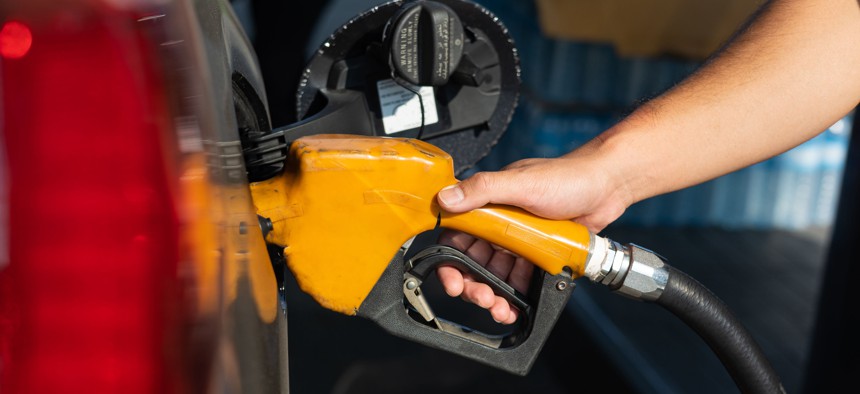After Months of Talk, States Move to Suspend Gas Taxes

State officials are looking at ways to give relief to consumers paying high prices for gasoline. Getty Images / Jackyenjoyphotography
A Maryland plan is close to passing. But proposed gas tax holidays there and in other states could prove to be largely symbolic providing only minor relief at the pump.
Maryland could become the first state this year to offer drivers a break on gas taxes, in response to soaring fuel prices. But several other states appear to be close behind.
The rush to roll back gas taxes is an abrupt break in state policy from the last decade, when more states had raised fuel taxes in order to fix deteriorating roads and build new transportation projects. But now, flush with federal stimulus money and unexpected revenue surpluses, politicians of all stripes are trying to find ways to appeal to voters and address growing concerns about inflation.
Reversing gas taxes are a small, but symbolic, way to appeal to a disgruntled public.
Lawmakers in Annapolis appeared ready to send Maryland Gov. Larry Hogan a bill Thursday that would create a 30-day “holiday” from the state’s gas tax, which is a little more than 36 cents per gallon of gasoline.
“This is going to be a big help. It’s going to save consumers $150 million at the pump. As the prices are rising, it’s got to help to have 37 cents less per gallon,” Hogan said Wednesday.
The actual price of gasoline may not reflect that full amount, because gas taxes are collected at the wholesale, rather than the retail, level. But the Republican governor noted that Maryland’s legislation included a provision noting the legislature’s intent that the reduction “shall be reflected in sales to consumers.”
The one-month pause in gas tax collections received bipartisan support in the Maryland legislature, but some Republican lawmakers are pushing to go even further. They want to stop automatic increases in the gas tax rates that help the taxes keep pace with inflation. Hogan, who proposed a similar measure shortly after becoming governor in 2015, said he still supports that idea.
Hogan also said the break from gas taxes might have to be extended longer.
“I’m not convinced it’s going to be solved in 30 days. I actually pressed for longer,” he said. But the governor pointed out that taking $150 million a month out of the state budget could affect other items in the state budget.
Similar Plans Underway
Other states are considering measures similar to Maryland’s.
Georgia Gov. Brian Kemp, a Republican, is expected to sign a measure on Friday to suspend his state’s gas tax through the end of May.
Florida lawmakers have agreed to suspend the state’s gas tax – an idea supported by Republican Gov. Ron DeSantis and his likely Democratic opponent, former Gov. Charlie Crist – but there’s a catch. The monthlong hiatus won’t come until October, when tourism is low and the November elections are near.
Connecticut Gov. Ned Lamont is supporting a bipartisan proposal to scale back the state’s gas tax by 25 cents for up to three months, although details are still being worked out.
Virginia’s new Republican governor, Glenn Youngkin, called on the politically divided legislature to suspend the state’s gas tax for three months. Democrats were noncommittal. Senate Majority Leader Dick Saslaw noted that fuel prices have actually been decreasing. He emphasized that the state needs revenue from gas taxes to keep up its transportation networks. “Some roads [in my district] even look like a war has been fought on them,” he said.
Some Proposals Meet Opposition
In some states, though, proposals to lower state gas taxes have hit significant opposition.
Michigan Gov. Gretchen Whitmer, who was one of several Democratic governors to call for a suspension of the federal gas tax, is expected to veto a measure passed by Republican lawmakers to suspend the gas tax at the state level. Whitmer’s spokesperson pointed out to reporters that the GOP measure would not take effect until next year.
In Arizona, Republican Gov. Doug Ducey blamed the Biden administration for high gas prices, but said suspending the state’s gas tax won’t help. “We should be expanding energy production and not pursuing gimmicks,” he said, according to the Arizona Daily Star.
Many tax experts have also criticized the rush to suspend gas taxes.
“A gas tax holiday may be good politics, but it is unlikely to achieve its aims,” wrote Jared Walczak, the vice president of state projects for the right-leaning Tax Foundation. “Fuel prices are high for many reasons right now: general inflation, higher transportation costs, the isolation of Russian markets, and more.”
Carl Davis, the research director for the left-leaning Institute on Taxation and Economic Policy, said the sudden interest in scaling back on gas taxes was remarkable, given how much bipartisan support there was for increasing fuel taxes to support infrastructure just a few months ago.
“Lawmakers’ impulse to lessen the blow of higher prices on consumers is admirable and, frankly, a gas tax holiday is nowhere close to being the worst state tax proposal to surface this year. But it’s unlikely that state gas tax holidays will meaningfully benefit consumers, and they come with risks for states’ infrastructure quality,” Davis wrote.
“Even under relatively generous assumptions, I anticipate that less than half of the revenue sacrificed through this kind of holiday would find its way into the pockets of low- and middle-income residents, with the remainder flowing to some mix of oil companies, tourists, high-income families and long-haul truckers just passing through,” he explained.
Davis noted that the high inflation that is hitting consumers will soon pose problems for state governments, as well, as highway construction costs and other expenses rise and federal aid for states dries up.
Daniel C. Vock is a senior reporter at Route Fifty and is based in Washington, D.C.
NEXT STORY: Senate Lawmakers Want to Overhaul How Wastewater Funds are Divided






